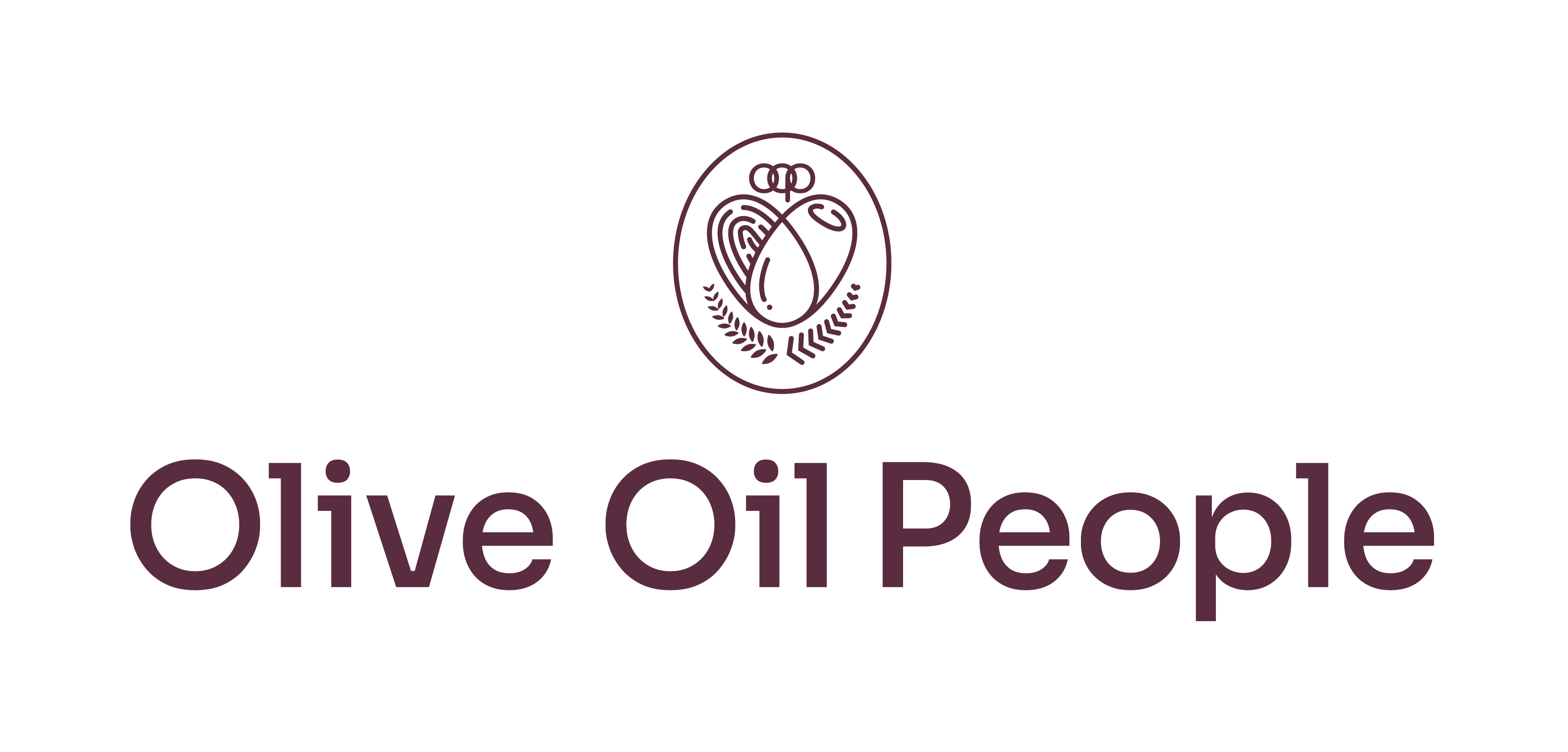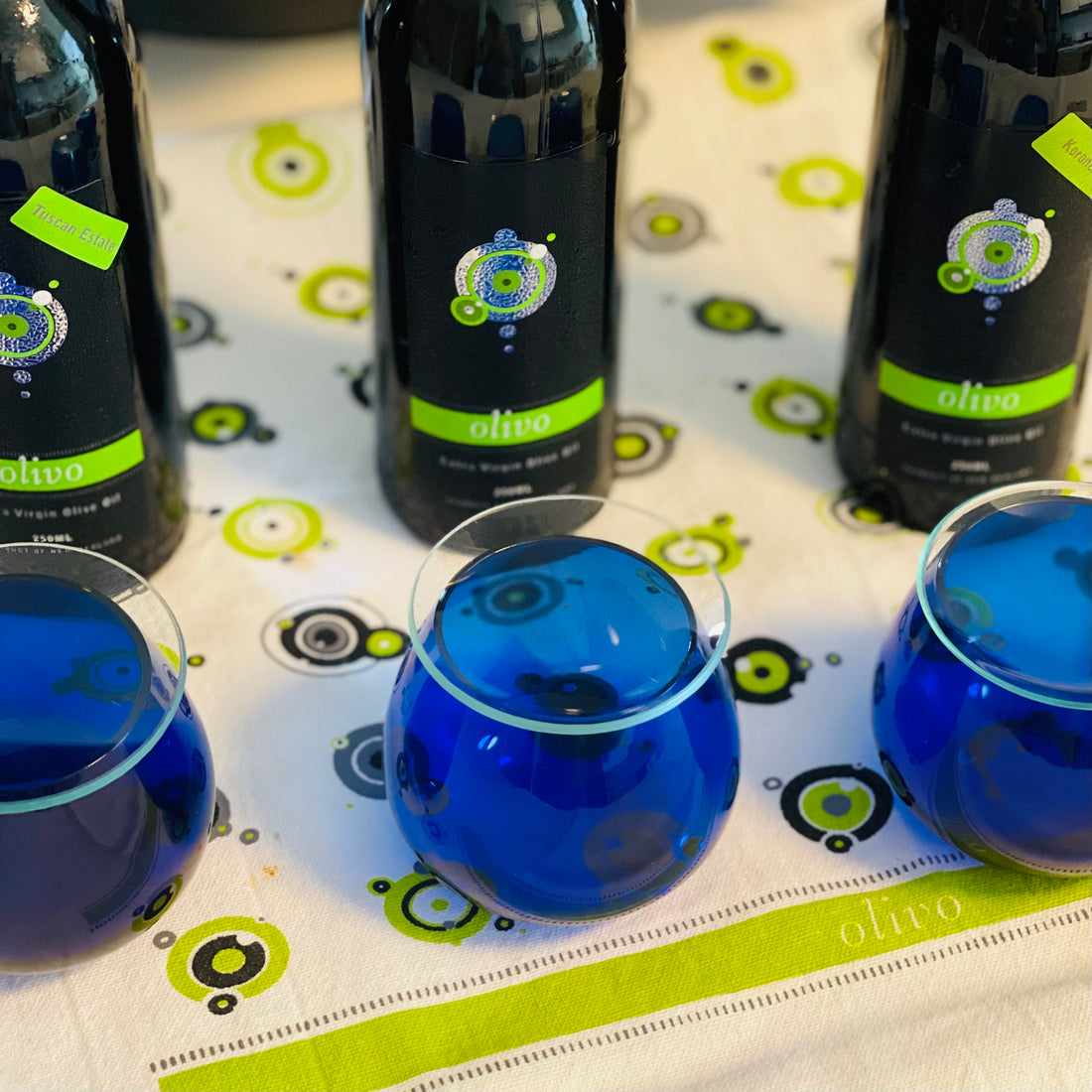Take a peek behind the scenes of what happens at formal olive oil tastings and how the rest of us can also be empowered to navigate the complex world of olive oil
Learn why a professional tasting panel is still the only approved method for quality control in olive oil grading, when completed in tandem with physicochemical lab analysis. Read about the factors that influence tasting accuracy and the steps and protocols that tasters observe to ensure accuracy of sensory assessments. Find out how a guided tasting with a sommelier can help the rest of us become more empowered consumers of a product that can seem shrouded in mystery and jargon.
Last Updated: 24 November 2021 | Olive Oil Tasting
When it comes to extra virgin olive oil, appreciation of it simply means looking at how the oil smells, tastes and feels on the tongue; Sensory Analysis. In a formal tasting panel, the goal of olive oil sensory analysis is to determine the olive oil's organoleptic qualities so that it may be classified and graded in accordance with IOC (International Olive Council) standards.
Trained and accredited tasting panels are the only approved method for grading olive oil
While human sensory analysis may have a larger degree of uncertainty and variability than other non-human methods like “electronic noses”, it is currently the only method approved for categorizing extra virgin olive oils when completed in tandem with physicochemical lab analysis, and may only be performed by taste panels that have been formally accredited. So far, methods like “electronic noses” have not been able to replicate the nuances that trained human tasters can capture.
Compounds in olive oil are so numerous and complicated, and their interactions are still not fully known, so sensorial analysis is needed to help with quality control. The richness and deep subtleties found in extra virgin olive oil's scent and flavour are an intrinsic component of its makeup. This distinguishes it from all other vegetable oils. Both volatile and non-volatile components contribute to the taste qualities of extra virgin olive oil.
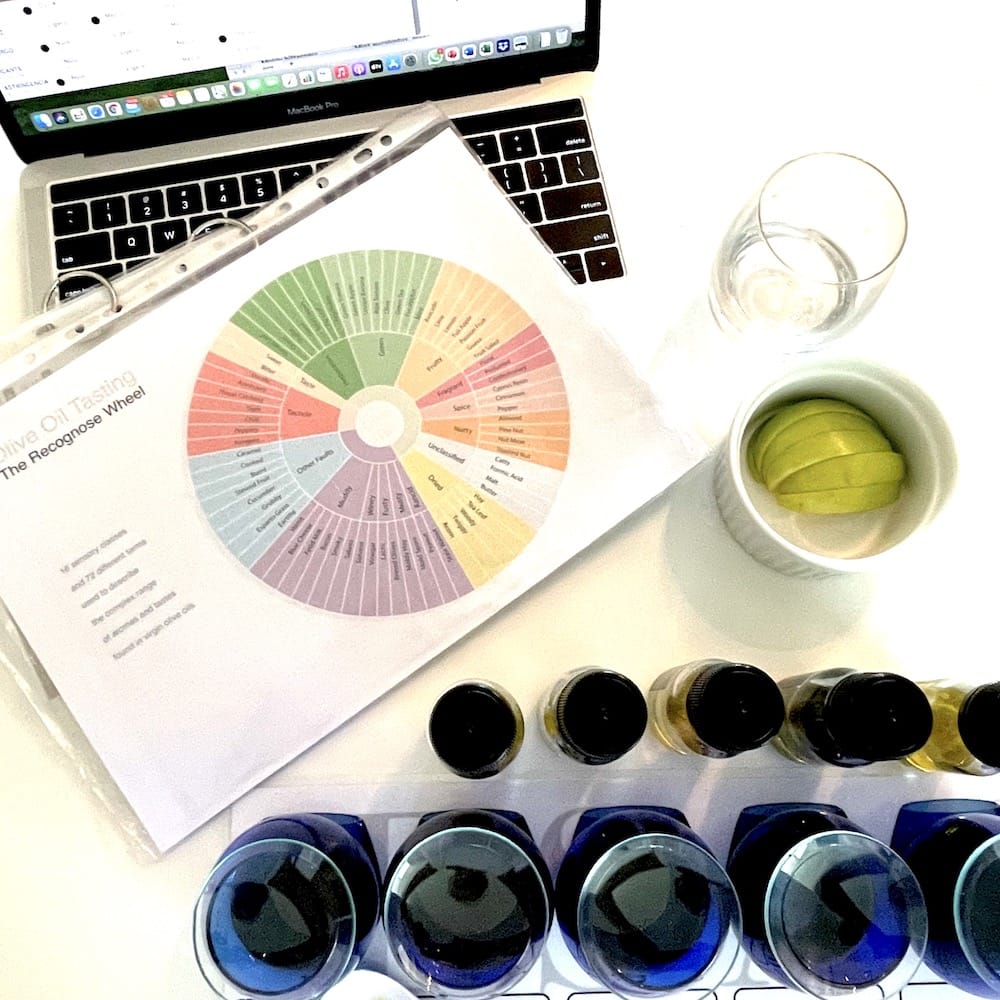
 Photo: Olive Oil People
Photo: Olive Oil PeopleThe tastes and smells of extra virgin olive oil
There are five fundamental tastes that are commonly recognized in most cultures: sweet, sour, salty, bitter and umami. Pungency or pepperiness is not a taste stimulus in the traditional sense, but it is a tactile feeling which is noticeable in the throat, when tasting very good extra virgin olive oil. According to the standards of the IOC, bitterness and pungency are considered positive characteristics of extra virgin olive oil. These two taste attributes have been linked to the healthful components of olive oil such as oleocanthal, a phenol that has anti-inflammatory properties.
However, the foremost important attribute in extra virgin olive oil tasting comes from the olfactory or smell analysis part of the process, where tasters look for the presence of fruity aromas and absence of defects. As humans, we can detect between 2000 to 4000 different aromas and it is these abilities that are harnessed and honed by tasters.
-------------

Join us on 18th Nov 2023. Learn the essentials while treating your tastebuds to an adventure of some of greatest extra virgin olive oils in the world!
Learn more and buy tickets HERE.
--------------
Two most important factors - the competency of tasters and proper handling of oil samples
The oil sample and the taster are the two most important components in sensory analysis. In extra virgin olive oil tasting, the median assessment value is taken from the taste assessment of a group of tasters (typically 8 to 12 people) to compensate for taster disparities and avoid potential pitfalls with individual tasting. Not surprisingly, a taster's sensory accuracy is influenced by a number of elements as such:
- Innate traits: The genetic composition of an individual might impact the capacity to recognize odours or tastes in general or particular ones. Everyone has an intrinsic aptitude for interpreting stimuli.
- Concentration: The capacity for concentration and the ability to distinguish irrelevant stimuli.
- Interest: Great interest is what often helps a person to circumvent genetic or other inherent limitations. The head of a tasting panel would always prefer to have a highly engaged individual who regularly attends training sessions.
- Physiology: Physiological traits like inclinations, age, and state of health will play a vital role in taste perception. The significance of a sample might be skewed if a taster is unwell or anxious about something.
- Tendencies or biases: Everyone has their own preferences. The panel head will pay attention to eliminating implicit tendencies that might distort the outcomes.
On the side of the oil sample, several variables may influence the results of sample analysis. The first factor to consider is the sample's temperature since a sample that is not at the proper temperature makes it harder to distinguish between good and bad aspects. The second factor is the amount of virgin olive oil in each sample since the results might be tainted if the amount is not standardised. Thirdly, another important consideration is the olive varietal of the samples used as it may have an influence on the sensory evaluation of the oil e.g. due to lack of familiarity to a certain varietal. Last but not least, it is highly recommended, where possible, to ensure samples are tasted in ascending order of flavour intensity from milder to robust, to avoid misleading results.
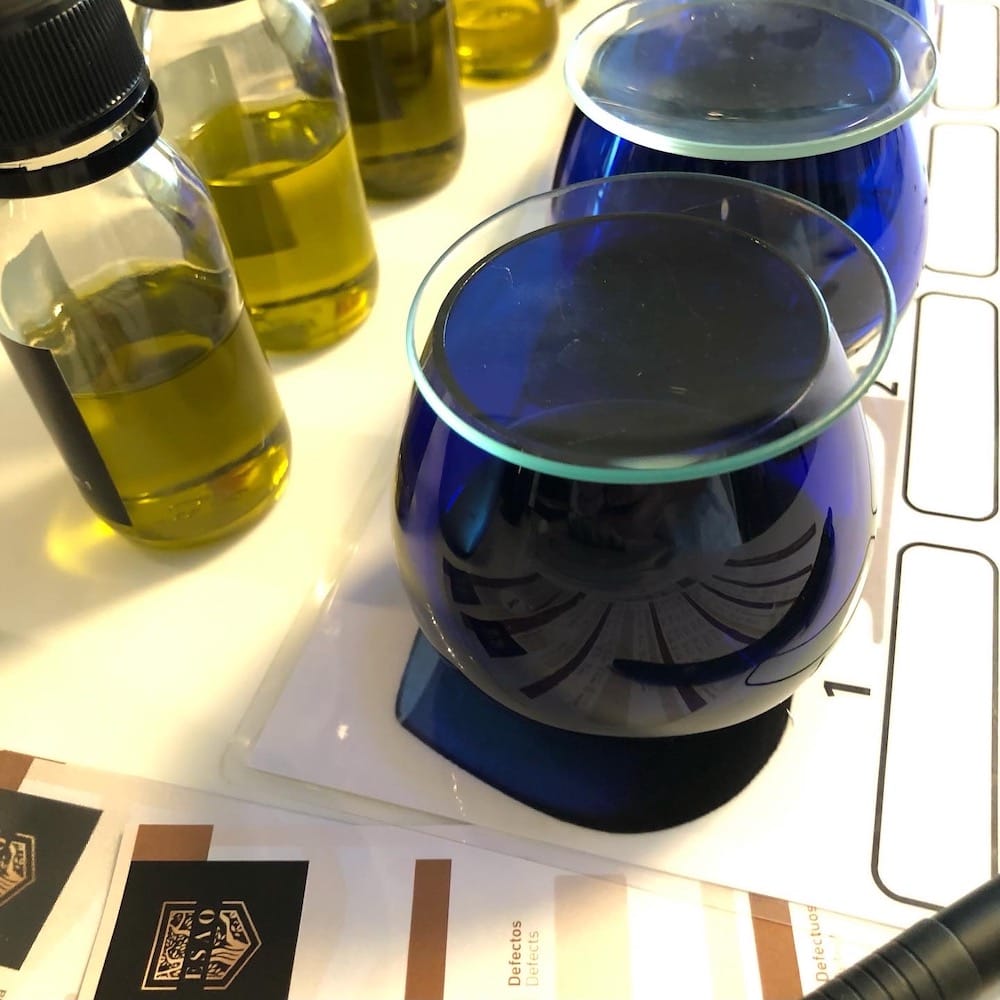

Photo: Olive Oil People
The importance of tasting protocols
Given such known influences, tasters have to observe a set of protocols before and during the tasting sessions which include parameters such as number of tasters in a panel, maximum tasting sessions per day, maximum number of samples per tasting session, limits on consumption of foods, beverages or smoking before tasting sessions, the ideal time of day to taste, required length of breaks to avoid sensory fatigue and the requirement of having a relaxed and calm state of mind. Likewise, tasting rooms have to comply with certain ambient requirements such as wall colour, absence of noise and ideal temperatures among other technical and equipment requirements.
What tasters do when tasting olive oil samples
Typically, olive oils are rated on the basis of their mild, medium, or intense/robust flavours. The olive variety, the stage of maturity at which the olive is picked, and the methods observed to extract the oil from the olive fruit all have an effect on the various types and qualities of olive oil.
Here’s a brief look at the steps followed when tasters conduct olive oil tastings.
- Pour: 15ml of extra virgin olive oil is added to a special IOC approved tasting glass with a lid.
- Swirl: The glass is warmed by cupping it with one hand and covering it with the other holding the lid and swirling the oil inside to release its aromas. In a professional tasting panel setting, warming devices are used to ensure a consistent 26℃-30℃ for all samples.
- Sniff: Tasters then take off the lid and sniff the oil sample twice. The first sniff is to take in general impressions of the oil, and in the second sniff they note down the most evident attributes and make a conclusion as to the presence or absence of defects. Tasters would note down all of their olfactory-related observations and assess the intensity on a scale of 0-10. At the same time, they’ll be able to determine whether or not the fruit of the oil is green or mature. By paying attention to the sensations associated with unique or aberrant smells, they would also attempt to determine what the defects are, if it is detected.
- Taste: Next, the tasters put about 3ml of oil or a small teaspoon full into their mouths and hold it for about -/+10 seconds in in their mouths while sucking in some air through the side of their mouths and teeth, in order to disperse the aromatic components all over their palates to identify the taste sensations on the front and back of their tongues. This action is sometimes called strippagio.
- Swallow: Finally, the tasters will swallow the oil observing the more tactile qualities like pungency or pepperiness which tend to develop at the back of the throat. At the same time, retronasal aromas are observed i.e. aromas that can be perceived in the retronasal duct.
- Record: Throughout and at the end of the tasting process, tasters would record their tasting notes and the intensity levels of the sensations using standard tasting sheets and rating scales determined by the International Olive Council (IOC).
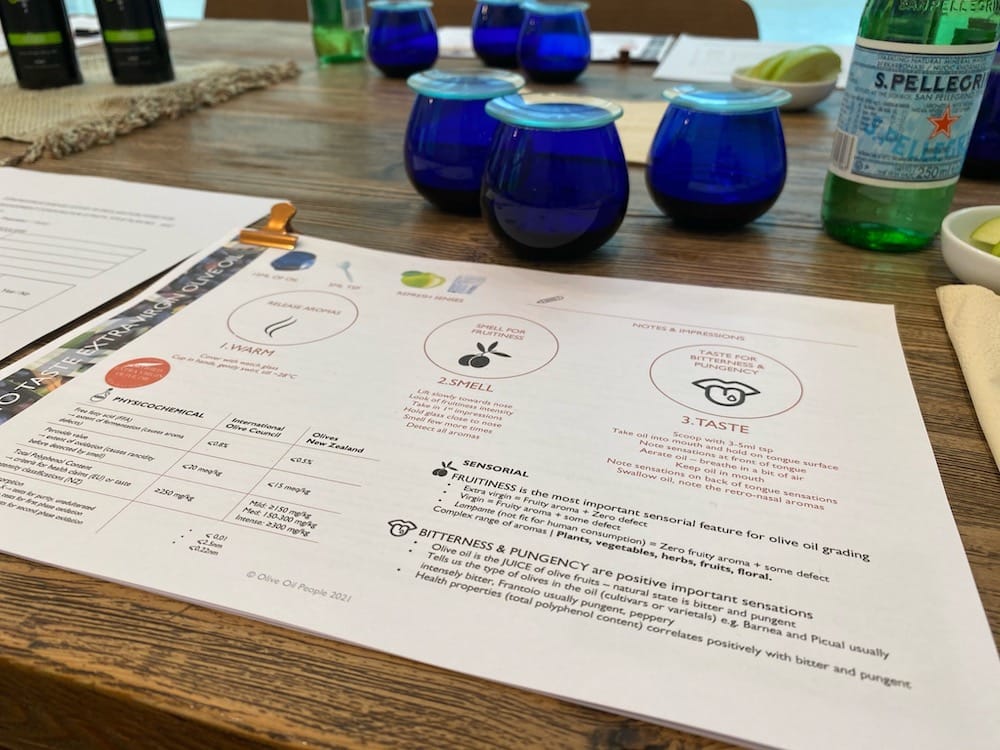

Photo: Olive Oil People
Appreciating extra virgin olive oil through guided tastings with a certified sommelier
For regular consumers of olive oil, we too can enjoy tasting olive oil to appreciate its multitude of flavours, especially when guided by an olive oil sommelier. We sometimes call this experience a hedonic tasting, is less technical and more enjoyable especially when done with a small group of friends or like-minded, curious people. A certified olive oil sommelier would usually simplify and tailor the tasting experiences to their target audience but should still retain all the critical points of formal tasting protocols to ensure overall integrity of a tasting experience. Additionally, guided tastings would typically include food pairing activities which are helpful for identifying one’s preferred flavour profiles.
Sessions should include all the basics of how to read labels, what true extra virgin olive oil should taste like, the requisite myth-busting factoids and much more, depending on allocated time and breadth and depth your olive oil sommelier’s experience. When done well using exceptional quality and fresh tasting olive oils, it is not uncommon for one to walk away from the experience feeling more empowered to navigate the complex world of olive oil.
Contact us at yeeling@oliveoilpeople.com to find out more about olive oil tasting sessions with a certified olive oil sommelier.
--------------------------

Join us on 18th Nov 2023. Learn the essentials while treating your tastebuds to an adventure of some of greatest extra virgin olive oils in the world!
Learn more and buy tickets HERE.
--------------
Author's note:
our blog posts are not meant to replace your physician’s advice. However, we do cross-reference facts and data points with expert sources, observations and research publications, where available. All photos by Olive Oil People.
